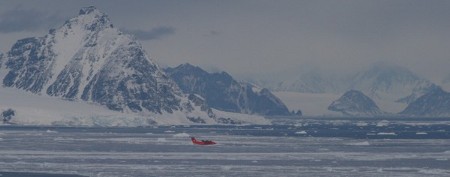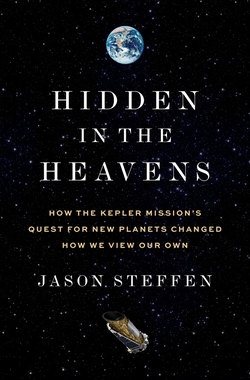If we’re looking for pristine environments for life, Antarctica offers much. More than 150 subglacial lakes have been discovered beneath the ice sheet, isolated from the surface for long periods and possibly home to species that have never before been observed. From November 2007 to February 2008, a subglacial lake named Lake Ellsworth was studied by a four-person team that used seismic and radar surveys to map the lake’s depth and take other measurements that made clear its potential for exploration. Their blog is archived here, and it makes for good reading.

Image: A DeHavilland Dash-7 flying near the British Antarctic Survey research station at Rothera. The station is 1630 kilometers southeast of Punta Arenas, Chile, and served as a staging area for the Lake Ellsworth studies of 2007-2008. Credit: Natural Environment Research Council.
Europa, anyone? Well, there are certain resemblances. If the thickness of the ice on Europa is still controversial, we know for a fact that Lake Ellsworth’s ice is three kilometers thick, covering a lake that is 150 meters deep. Lake-floor sediments here could offer clues to Earth’s past climate. The water remains liquid not only because of the insulating effect of the ice above, but because of heat from below coming up through the bedrock. Of course, Lake Ellsworth will require drilling to get into its uncontaminated water in the hunt for life. Europa, as we’ve seen recently, may not — a lander exploring near older cracks in Europan ice may turn up evidence for life-forms exposed to the surface by periodic melting.
Lake Vostok, in east Antarctica, is probably the best known subglacial lake, but they’re all interesting because the water within them may be as old as the ice sheet above. In Lake Ellsworth’s case, that means on the order of 150,000 years and perhaps more. The success of the recent studies have now led to a new effort involving researchers from a host of British institutions and funded by the UK’s Natural Environment Research Council. In the 2012-2013 Antarctic winter season, they’ll try to reach pristine lake water to sample it for life and extract sediments from the lake bed.
David Blake is head of technology and engineering at the British Antarctic Survey:
“This project is a great scientific challenge and the technology required to drill 3 km through the ice without contaminating the lake is equally ambitious. Over the next few years we will build a hot water drill and probe, and make preparations to transport a sophisticated operation deep into the interior of West Antarctica. We really are at the frontiers of scientific exploration.”
That bit about not contaminating the lake says it all. This is tricky business — recall that we eventually dispatched the Galileo Jupiter orbiter to a crushing end within the depths of Jupiter’s atmosphere, all because we wanted to be sure that it would never impact Europa. If a spacecraft that had been exposed to space for almost fourteen years was still thought a potential contamination hazard, how do we get a probe through Lake Ellsworth’s ice without introducing surface life? Clearly, the progress of the Lake Ellsworth effort will be worth watching. You can track developments at the Exploration of Subglacial Lake Ellsworth site.


I always felt kinda bad that someone decided to kill off Galileo after its faithful service.
Scientists really have a different headset that most other people. I read a snarky review of Clyde Tombaugh’s”Out of Darkness: The Planet Pluto” in Sky & Telescope by a professional astronomer. Tombaugh spent some time in the book describing the 13-inch astrograph he used for the discovery of Pluto. The reviewer said something to the effect that Tombaugh “had an amateur’s interest in equipment’.
When Lindbergh landed in Paris he said “We –(referring to Spirit of America) did it!” Pilots and sailors (and amateur astronomers) identify with their planes, ships and equipment. That seems lost on some scientists.
I could see if a professional astronomer had been the first to fly the Atlantic—“The airplane? No, it does not have a name. Why would anyone want to name a piece of equipment? I had it scrapped after the flight. Why would anyone want to keep it after it had served its purpose? ”
People sometimes wonder why the general public is not more interested in science. Perhaps if some of the wonder of planetary exploration was expressed and maybe even some affection for a far-off spacecraft that performed well…
Frank,
I think that the Galileo probe was terminated because it was in bad shape and there was a real chance that control could be lost and it would crash on Europa contaminating it.
I still remember that data was lost in quite a few flybys of important targets due to the probe entering safe mode after radiation induced malfunctions.
There might have been some budgetary reasons behind its demise as well, but I think it had essentially finished its mission and it could have caused unwanted contamination if it were allowed to continue.
This article has been added to the Astronomy Link List.
April 17, 2009
Ancient Antarctic Ecosystem Could be Analog for Life on Other Worlds
Written by Nancy Atkinson
An ecosystem found in this region of Antarctica. Courtesy of Jill Mikucki
Scientists have found an ancient ecosystem below an Antarctic glacier, one that has survived millions of years without light or oxygen in a pool of brine. The ecosystem contains a diversity of bacteria that thrive in cold, salty water loaded with iron and sulfur. The water averages 14 degrees Fahrenheit, but doesn’t freeze because the water is three or four times saltier than the ocean.
Scientists who discovered and studied the ecosystem found the bacteria convert the iron and sulfur into food. Life found in extreme conditions like this could explain how life might exist on other planets and serve as a model for how life can exist under ice. Some scientists have proposed that life could possibly be found under the outer ice layer of Jupiter’s moon Europa.
Described in the April 17 issue of Science, the ecosystem lives trapped below Taylor Glacier and next to frozen Lake Bonney in eastern Antarctica, said John Priscu a longtime Antarctic researcher.
Despite their profound isolation, the microbes are remarkably similar to species found in modern marine environments, suggesting that the organisms now under the glacier are remnants of a larger population that once occupied an open fjord or sea.
Full article here:
http://www.universetoday.com/2009/04/17/ancient-antarctic-ecosystem-could-be-analog-for-life-on-other-worlds/
Ancient Antarctic Ice Sampled In Lake Vostok Drill
by Tammy Plotner on February 8, 2012
Sealed off for millions of years beneath an almost impenetrable layer of ice, Lake Vostok has kept a vast archive of ancient history waiting for just the right moment to reveal itself. Here is a unique closed ecosystem captured in time below four kilometers of ice.
Saved from environmental contamination, its water has been isolated from Earth’s atmosphere, and the outside world, long before man existed. Only one burning question remains… Could this pristine pocket of Lake Vostok show signs of early life?
“According to our research, the quantity of oxygen there exceeds that on other parts of our planet by 10 to 20 times. Any life forms that we find are likely to be unique on Earth,” says Sergey Bulat, the Chief Scientist of Russia’s Antarctic Expedition to Russian Reporter magazine.
So why be so excited over finding a few organisms? The reason is clear as the hidden waters. If a life form could exist here, it could also exist on a similar world…. Jupiter’s satellite, Europa.
“The discovery of microorganisms in Lake Vostok may mean that, perhaps, the first meeting with extra-terrestrial life could happen on Europa,” said Dr Vladimir Kotlyakov, Director of the Geography Institute at the Russian Academy of Sciences to Vzglyad newspaper.
Full article here:
http://www.universetoday.com/93457/ancient-antarctic-ice-sampled-in-lake-vostok-drill/#
This is one time it is okay to say “Drill, baby, drill!” :^) Though I cannot help but feel this whole event feels like the setup to a great B-grade science fiction film: A Russian science team drills through the ice of a remote Antarctic lake that has remained sealed off by several miles of ice for millions of years. Who knows what might lurk down there. The team breaks through and sends in some brave, intrepid explorers. Suddenly we learn that no one has heard from the drilling team for weeks….